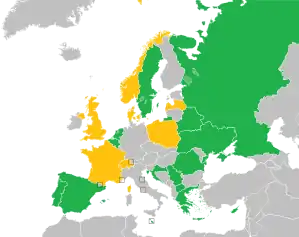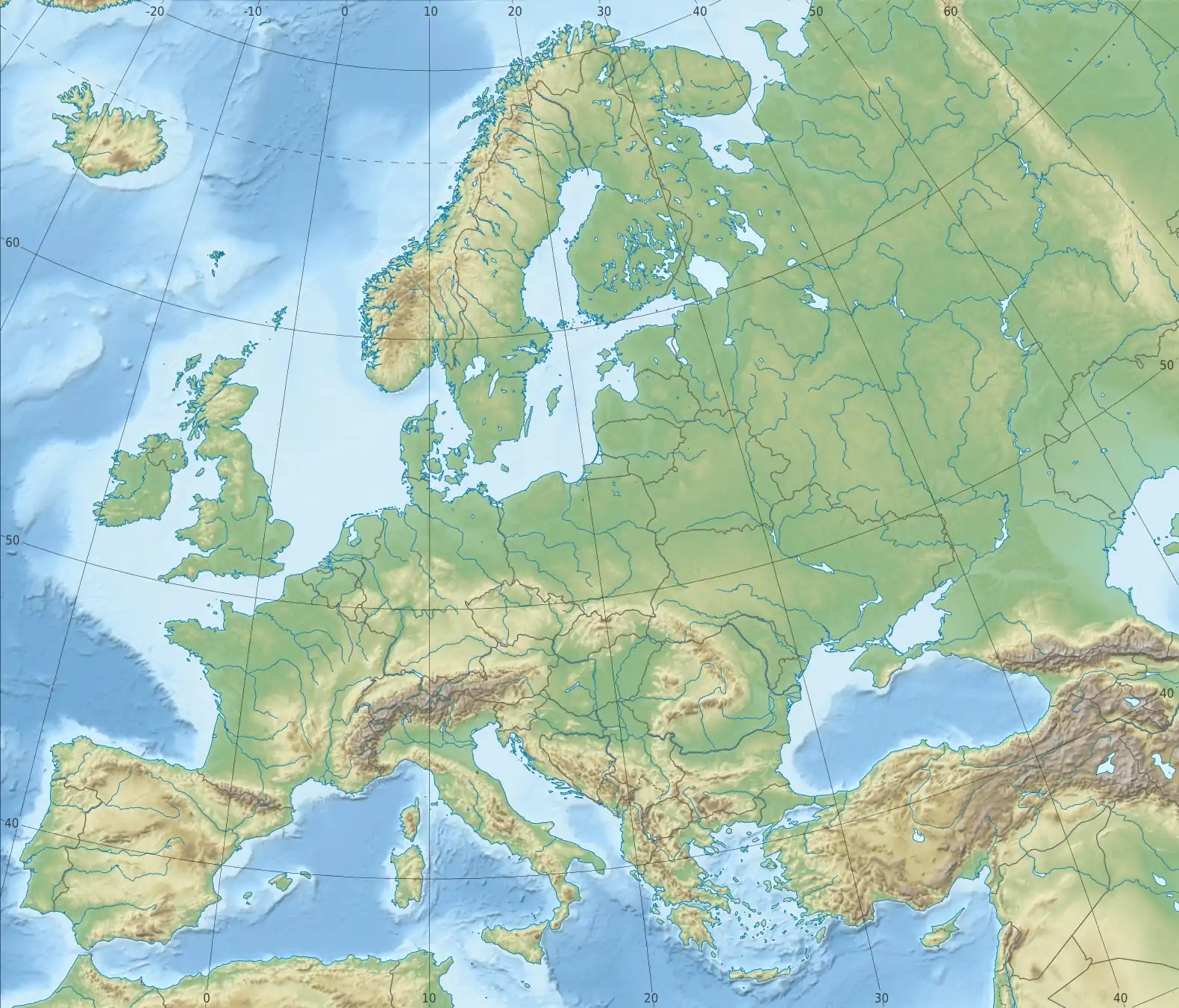Junior Eurovision Song Contest 2006
The Junior Eurovision Song Contest 2006 was the fourth edition of the annual Junior Eurovision Song Contest for young singers aged 8 to 15. On 2 December 2006, the contest was broadcast live from Bucharest, Romania making it the second time the contest had been held in a capital city. It was organised by the Romanian national broadcaster, Romanian Television (TVR), in co-operation with the European Broadcasting Union (EBU).[1]
| Junior Eurovision Song Contest 2006 | |
|---|---|
| Let The Music Play | |
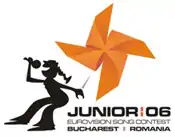 | |
| Dates | |
| Grand final | 2 December 2006 |
| Host | |
| Venue | Sala Polivalentă, Bucharest, Romania |
| Presenter(s) | Andreea Marin Bănică, Ioana Ivan |
| Directed by | Dan Manoliu |
| Executive supervisor | Svante Stockselius |
| Executive producer | Irina Radu |
| Host broadcaster | Televiziunea Română (TVR) |
| Opening act | Various circus style dancers and performers including an appearance by Mihai Trăistariu followed by a flag parade introducing the 15 participating countries |
| Interval act | Ksenia Sitnik, Break-dancing + traditional Romanian dancing and a remix of the last 3 Romanian participants at JESC. |
| Website | junioreurovision |
| Participants | |
| Number of entries | 15 |
| Debuting countries | |
| Returning countries | |
| Non-returning countries | |
Participation map
| |
| Vote | |
| Voting system | Each country awards 1–8, 10, and 12 points to their 10 favourite songs |
| Nul points | None |
| Winning song | "Vesenniy Jazz" |
The show was broadcast live in the competing countries, as well as Andorra, Bosnia and Herzegovina and the Australian television channel Special Broadcasting Service (SBS) that acquired the rights for broadcasting the show, which was broadcast on 1 January 2007. This was Serbia's first participation in a Eurovision event as an independent nation. The contest was won by The Tolmachevy Twins from Russia with the song "Vesenniy Jazz".
Location
Bidding phase and host selection
TVR won the rights of hosting the contest over AVRO of the Netherlands (who hosted the next contest).[1] Croatia also expressed an interest in hosting this contest.[2]
Venue
.JPG.webp)
Polyvalent Hall from Bucharest (Romanian: Sala Polivalentă din București) is a multi-purpose hall in Bucharest, Romania, located in the Tineretului Park. It is used for concerts, indoor sports such as tennis, gymnastics, dance, handball, volleyball, basketball, weightlifting, combat sports and professional wrestling. The hall was opened in 1974 but has since been renovated. It has a maximum seating capacity of 12,000 for concerts and 6,000 for handball.
Participation
Originally 16 countries had initially signed up for the contest but one unspecified country later dropped out.[3]
Broadcasting in Belgium
Radio télévision belge de la communauté française (RTBF) of the French-speaking Wallonia in Belgium left the contest this year after co-hosting the previous edition with Flemish broadcaster Vlaamse Radio- en Televisieomroep (VRT). They claimed that continuing with the contest was not in their interests financially.[4] The viewing figures for the 2005 contest for RTBF were also low. Belgium continued to be represented at the contest by VRT.
2007 Croatian withdrawal
Hrvatska radiotelevizija (HRT) of Croatia announced that they would withdraw from the 2007 edition and future contests, as otherwise they would have faced a fine from the EBU as they did not screen this year's event live and did not broadcast it on a nationally available network, instead airing it on satellite-only channel HRT Plus. Broadcasters previously had to screen the event live and on a channel available to the majority of the public however this rule was scrapped in 2007.[5] Croatia withdrew the following year and would not participate for seven years until they returned in 2014.
Withdrawn countries
The Scandinavian broadcasters; DR of Denmark, Norsk rikskringkasting (NRK) of Norway and Sveriges Television (SVT) of Sweden; decided to withdraw from the contest for various reasons, one being that the content put too much pressure on the participating children. Instead they staged a solely Scandinavian contest called Melodi Grand Prix Nordic in Stockholm, as they did in 2002. However, Sweden did participate, which was quite unexpected since they placed 15th all earlier years, with commercial broadcaster TV4 supplying Sweden's entry. This meant that Sweden participated in both contests.
ITV, the United Kingdom broadcaster of the contest from 2003 up until and including 2005, withdrew from the contest, after they were originally given the rights to broadcast it when the BBC declined the offer. In 2003, they broadcast the contest on main channel ITV, relegating it to ITV2 for the next two years due to bad viewer ratings, before their complete withdrawal in 2006.
Monaco had stated an interest to take part in the contest, however did not take part in the contest.[6] Latvia also withdrew, mainly due to financial reasons. However they briefly returned to the contest in 2010 and 2011.
Serbia and Montenegro participated in the 2005 contest, but since then, Montenegro voted for independence. The EBU gave their national broadcaster, Radio televizija Crne Gore (RTCG), extra time to decide whether or not to participate, but they finally declined the invitation. It wasn't until 2014 that they would start participating in the Junior Eurovision.
Results
| Draw | Country | Artist | Song | Language | Place | Points |
|---|---|---|---|---|---|---|
| 01 | Pedro Madeira | "Deixa-me sentir" | Portuguese | 14 | 22 | |
| 02 | Luis Panagiotou & Christina Christofi | "Agoria koritsia" (Αγόρια κορίτσια) | Greek | 8 | 58 | |
| 03 | Kimberly Nieuwenhuis | "Goed" | Dutch | 12 | 44 | |
| 04 | New Star Music | "Povestea mea" | Romanian | 6 | 80 | |
| 05 | Nazar Slyusarchuk | "Khlopchyk Rock 'n' Roll" (Хлопчик рок н рол) | Ukrainian | 9 | 58 | |
| 06 | Dani Fernández | "Te doy mi voz" | Spanish | 4 | 90 | |
| 07 | Neustrašivi učitelji stranih jezika | "Učimo strane jezike" (Учимо стране језике) | Serbian, English1 | 5 | 81 | |
| 08 | Sophie Debattista | "Extra Cute" | English | 11 | 48 | |
| 09 | Zana Aliu | "Vljubena" (Вљубена) | Macedonian | 15 | 14 | |
| 10 | Molly Sandén | "Det finaste någon kan få" | Swedish | 3 | 116 | |
| 11 | Chloe Sofia Boleti | "Den peirazei" (Δεν πειράζει) | Greek | 13 | 35 | |
| 12 | Andrey Kunets | "Noviy den" (Новый день) | Russian | 2 | 129 | |
| 13 | Thor! | "Een tocht door het donker" | Dutch | 7 | 71 | |
| 14 | Mateo Đido | "Lea" | Croatian | 10 | 50 | |
| 15 | Tolmachevy Twins | "Vesenniy Jazz" (Весенний джаз) | Russian | 1 | 154 |
Notes
Score sheet
| Results | |||||||||||||||||
|---|---|---|---|---|---|---|---|---|---|---|---|---|---|---|---|---|---|
| Portugal | 22 | 7 | 3 | ||||||||||||||
| Cyprus | 58 | 3 | 2 | 3 | 5 | 3 | 3 | 3 | 12 | 6 | 6 | ||||||
| Netherlands | 44 | 5 | 8 | 2 | 8 | 6 | 3 | ||||||||||
| Romania | 80 | 6 | 8 | 1 | 4 | 12 | 4 | 2 | 6 | 7 | 7 | 3 | 2 | 4 | 2 | ||
| Ukraine | 58 | 5 | 2 | 4 | 6 | 5 | 4 | 8 | 1 | 3 | 8 | ||||||
| Spain | 90 | 7 | 5 | 7 | 8 | 6 | 3 | 1 | 8 | 8 | 5 | 7 | 7 | 1 | 5 | ||
| Serbia | 81 | 2 | 4 | 5 | 5 | 7 | 2 | 7 | 10 | 4 | 1 | 5 | 5 | 5 | 7 | ||
| Malta | 48 | 1 | 1 | 3 | 1 | 1 | 1 | 7 | 5 | 3 | 2 | 4 | 7 | ||||
| Macedonia | 14 | 2 | |||||||||||||||
| Sweden | 116 | 8 | 7 | 12 | 7 | 8 | 4 | 8 | 10 | 2 | 6 | 10 | 10 | 2 | 10 | ||
| Greece | 35 | 12 | 1 | 7 | 3 | ||||||||||||
| Belarus | 129 | 12 | 6 | 4 | 10 | 10 | 8 | 6 | 12 | 5 | 10 | 8 | 6 | 8 | 12 | ||
| Belgium | 71 | 4 | 3 | 8 | 6 | 3 | 5 | 2 | 6 | 1 | 1 | 2 | 4 | 10 | 4 | ||
| Croatia | 50 | 6 | 2 | 10 | 12 | 6 | 1 | 1 | |||||||||
| Russia | 154 | 10 | 10 | 10 | 12 | 12 | 10 | 12 | 4 | 4 | 12 | 10 | 12 | 12 | 12 | ||
| The table is ordered by appearance All countries automatically receive 12 points | |||||||||||||||||
12 points
Below is a summary of all 12 points received:
| N. | Contestant | Voting nation |
|---|---|---|
| 7 | Russia | Belarus, Belgium, Croatia, Romania, Serbia, Sweden, Ukraine |
| 3 | Belarus | Malta, Portugal, Russia |
| 1 | Croatia | Macedonia |
| Cyprus | Greece | |
| Greece | Cyprus | |
| Romania | Spain | |
| Sweden | Netherlands |
- All countries were given 12 points at the start of voting. This was so no country got nul points.
International broadcasts and voting
Voting and spokespersons
 Portugal – Joana Galo Costa
Portugal – Joana Galo Costa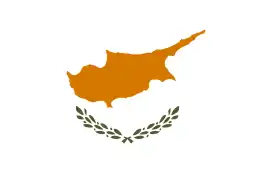 Cyprus – George Ioannidies (Cypriot representative in 2007)
Cyprus – George Ioannidies (Cypriot representative in 2007) Netherlands – Tess Gaerthe (Dutch representative in 2005)
Netherlands – Tess Gaerthe (Dutch representative in 2005) Romania – Andrea Nastase
Romania – Andrea Nastase Ukraine – Assol Gumenyuk
Ukraine – Assol Gumenyuk Spain – Lucía
Spain – Lucía.svg.png.webp) Serbia – Milica Stanišić
Serbia – Milica Stanišić Malta – Jack Curtis
Malta – Jack Curtis Macedonia – Denis Dimoski (Macedonian representative in 2005)
Macedonia – Denis Dimoski (Macedonian representative in 2005) Sweden – Amy Diamond
Sweden – Amy Diamond Greece – Alexandros Chountas (Greek representative in 2005 with Kalli Georgelli)
Greece – Alexandros Chountas (Greek representative in 2005 with Kalli Georgelli).svg.png.webp) Belarus – Liza Anton-Baychuk
Belarus – Liza Anton-Baychuk.svg.png.webp) Belgium – Sander Cliquet
Belgium – Sander Cliquet Croatia – Lorena Jelusić (Croatian representative in 2005)
Croatia – Lorena Jelusić (Croatian representative in 2005) Russia – Roman Kerimov
Russia – Roman Kerimov
Participating countries
 Ukraine – Timur Miroshnychenko (NTU)[7]
Ukraine – Timur Miroshnychenko (NTU)[7] Spain – Fernando Argenta and Lucho (TVE)
Spain – Fernando Argenta and Lucho (TVE).svg.png.webp) Belgium – Ilse Van Hoecke and Jelle Cleymans (VRT)
Belgium – Ilse Van Hoecke and Jelle Cleymans (VRT) Russia – Olga Shelest (RTR)
Russia – Olga Shelest (RTR) Sweden – Adam Alsing (TV4)
Sweden – Adam Alsing (TV4) Netherlands – Sipke Jan Bousema (AVRO)
Netherlands – Sipke Jan Bousema (AVRO).svg.png.webp) Serbia – Duška Vučinić-Lučić (RTS2)
Serbia – Duška Vučinić-Lučić (RTS2) Macedonia – Milanka Rašik (MTV 1)
Macedonia – Milanka Rašik (MTV 1) Cyprus – Kyriakos Pastides (CyBC)
Cyprus – Kyriakos Pastides (CyBC).svg.png.webp) Belarus – Denis Kurian (BTRC)
Belarus – Denis Kurian (BTRC) Greece – Renia Tsitsibikou and George Amyras (ERT)
Greece – Renia Tsitsibikou and George Amyras (ERT) Portugal – Isabel Angelino (RTP)
Portugal – Isabel Angelino (RTP) Romania – Ioana Isopecu and Alexandru Nagy (TVR1)
Romania – Ioana Isopecu and Alexandru Nagy (TVR1) Malta – Valerie Vella (PBS)
Malta – Valerie Vella (PBS) Croatia – TBC (HRT)
Croatia – TBC (HRT)
Other countries
For a country to be eligible for potential participation in the Junior Eurovision Song Contest, it needs to be an active member of the EBU. It is currently unknown whether the EBU issue invitations of participation to all 56 active members like they do for the Eurovision Song Contest.
Official album
| Junior Eurovision Song Contest 2006 | ||||
|---|---|---|---|---|
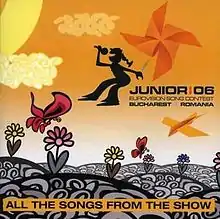 | ||||
| Compilation album by | ||||
| Released | November 2006 | |||
| Genre | Pop | |||
| Length |
| |||
| Label | Universal | |||
| Junior Eurovision Song Contest chronology | ||||
| ||||
Junior Eurovision Song Contest 2006, is a compilation album put together by the European Broadcasting Union, and was released by Universal Music Group in November 2006. The album features all the songs from the 2006 contest, along with karaoke versions.
| No. | Title | Artist | Length |
|---|---|---|---|
| 1. | "Deixa-me sentir" | Pedro Madeira (Portugal) | 2:46 |
| 2. | "Agoria koritsia" | Luis Panagiotou & Christina Christofi (Cyprus) | 2:41 |
| 3. | "Goed" | Kimberly Nieuwenhuis (Netherlands) | 2:46 |
| 4. | "Povestea mea" | New Star Music (Romania) | 2:31 |
| 5. | "Khlopchyk Rock 'n' Roll" | Nazar Slyusarchuk (Ukraine) | 2:48 |
| 6. | "Te doy mi voz" | Dani (Spain) | 2:45 |
| 7. | "Učimo strane jezike" | Neustrašivi učitelji stranih jezika (Serbia) | 2:32 |
| 8. | "Extra Cute" | Sophie Debattista (Malta) | 2:43 |
| 9. | "Vljubena" | Zana Aliu (Macedonia) | 2:45 |
| 10. | "Det finaste någon kan få" | Molly Sandén (Sweden) | 2:42 |
| 11. | "Den peirazei" | Chloe Sofia Boleti (Greece) | 2:48 |
| 12. | "Noviy den" | Andrey Kunets (Belarus) | 2:40 |
| 13. | "Een tocht door het donker" | Thor! (Belgium) | 2:27 |
| 14. | "Lea" | Mateo Đido (Croatia) | 2:34 |
| 15. | "Vesenniy Jazz" | Tolmachevy Twins (Russia) | 2:37 |
| Total length: | 36:05 | ||
| No. | Title | Artist | Length |
|---|---|---|---|
| 1. | "Deixa-me sentir" (Karaoke version) | Pedro Madeira (Portugal) | 2:46 |
| 2. | "Agoria koritsia" (Karaoke version) | Luis Panagiotou & Christina Christofi (Cyprus) | 2:41 |
| 3. | "Goed" (Karaoke version) | Kimberly Nieuwenhuis (Netherlands) | 2:46 |
| 4. | "Povestea mea" (Karaoke version) | New Star Music (Romania) | 2:31 |
| 5. | "Khlopchyk Rock 'n' Roll" (Karaoke version) | Nazar Slyusarchuk (Ukraine) | 2:48 |
| 6. | "Te doy mi voz" (Karaoke version) | Dani (Spain) | 2:45 |
| 7. | "Učimo strane jezike" (Karaoke version) | Neustrašivi učitelji stranih jezika (Serbia) | 2:32 |
| 8. | "Extra Cute" (Karaoke version) | Sophie Debattista (Malta) | 2:43 |
| 9. | "Vljubena" (Karaoke version) | Zana Aliu (Macedonia) | 2:45 |
| 10. | "Det finaste någon kan få" (Karaoke version) | Molly Sandén (Sweden) | 2:42 |
| 11. | "Den peirazei" (Karaoke version) | Chloe Sofia Boleti (Greece) | 2:48 |
| 12. | "Noviy den" (Karaoke version) | Andrey Kunets (Belarus) | 2:40 |
| 13. | "Een tocht door het donker" (Karaoke version) | Thor! (Belgium) | 2:27 |
| 14. | "Lea" (Karaoke version) | Mateo Đido (Croatia) | 2:34 |
| 15. | "Vesenniy Jazz" (Karaoke version) | Tolmachevy Twins (Russia) | 2:37 |
| Total length: | 36:05 | ||
Notes
- Serbia had taken part, in the 2005 contest, as part of Serbia and Montenegro, but this was their first participation as an independent nation.
References
- "'EBU Confirms: Romania to host Junior 2006'". Retrieved 2 August 2018.
- 'Croatia and Romania want to host junior 2006' Archived 2006-11-16 at the Wayback Machine
- "'EBU: 16 countries signed up for Junior 2006'". Retrieved 2 August 2018.
- "'RTBF withdraws from Junior contest'". ESC Today. 29 November 2005. Retrieved 2008-06-22.
- "ESC Today article on withdrawal of Croatia". ESC Today. 20 January 2007. Archived from the original on 3 April 2012. Retrieved 9 May 2017.
- "Eurovision Monaco plans junior participation in 2006 - ESCToday.com". 22 July 2005. Retrieved 2 August 2018.
- «Дитяче Євробачення» як взірець для дорослого (in Ukrainian). Telekritika. 5 December 2006. Retrieved 2008-05-03.
- "Eurovision Israel getting into the JESC spirit". ESC Today. 22 November 2007. Retrieved 2 August 2018.
